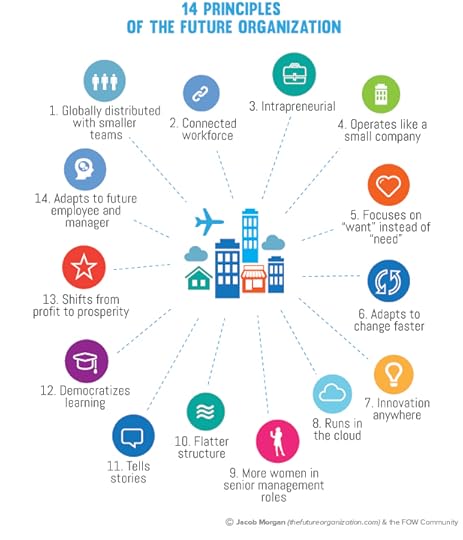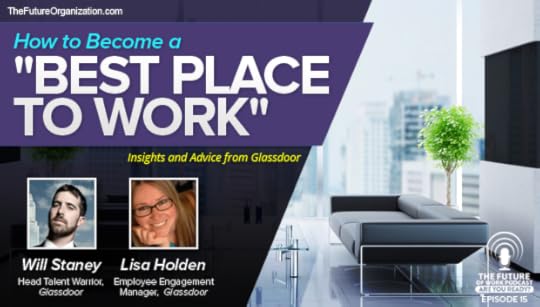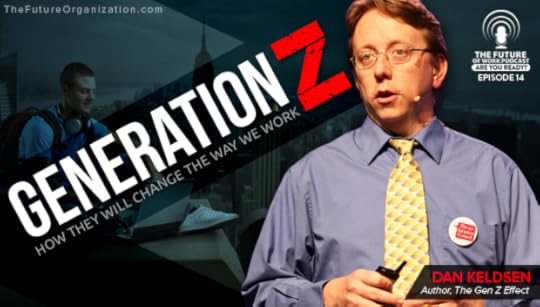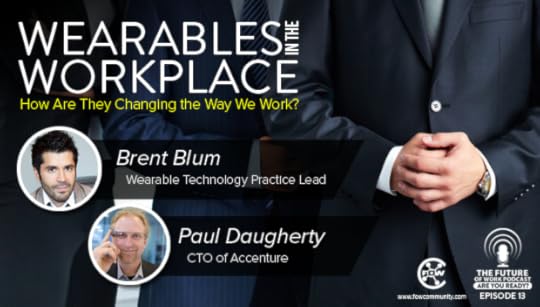Jacob Morgan's Blog, page 27
January 14, 2015
14 Principles of the Future Organization
Over the past few months I’ve been sharing a series of posts on the 7 Principles of the Future Employee and the Evolution of the Employee. This was followed by the 10 Principles of the Future Manager followed by the Evolution of the Manager. Today I want to introduce the 14 Principles of the Future Organization (which will eventually be followed up by the Evolution of the Organization). This is a concept that is taken from my latest book on The Future of Work and one that I feel is quite important. We are seeing an amazing evolution around how we work, how we lead, and how we structure our companies. These are the 14 Principles of the Future Organization.
Globally distributed with smaller teams
We are absolutely seeing a shift towards organizations “command and conquering” where they are distributed their real-estate and their employees among various pockets around the world. It’s not unusual to see a single employee working in a remote location just so the company can say they have an “office” there. Talent is no longer dependent on proximity to the corporate headquarters. In addition the Jeff Bezos “two pizza rule” is a must in order to allow employees to actually get work, that is, a team should be able to be fed by two pizzas, if the team is larger than “two pizzas” it’s too big.
Connected workforce
A company cannot have a distributed workforce unless that workforce is able to stay connected with the right people and information; anytime, anywhere, and on any device. This means deploying the right collaborative technologies that enable this to happen. Technology is the central nervous system of an organizaiton.
Intrapreneurial
The same spirit, passion, and creativity that entrepreneurs have must also be fostered inside of organizations. Employees should be able to test out ideas, run experiments, pitch new projects, and “run” with the ones that have potential.
Operates like a small company
A small company make decisions quickly, isn’t bogged down by bureaucracy, and are more agile and adaptable. In a rapidly changing world organizations cannot operate as their stereotypical “larger selves” where employees spend all their time checking emails, have meetings about having meetings, and basically operate at the speed of sludge.
Focuses on “want” instead of “need”
Organizations used to assume that employees worked there because they needed to. Today, talented employees are seeing all sorts of opportunities to make a living beyond traditional employment. This means that in order to attract top talent organizations must create an environment where employees actually WANT to be there instead of assuming that they NEED to be there.
Adapts to change faster
Today, “late followers” means “out of business.” Years ago it was acceptable to see what other companies were doing and being a “fast follower,” not so today. Decisions have to made faster and actions need to be more swift. This isn’t just an adaptation to technology either, new behaviors entering the workforce are also crucial to pay attention to and embrace.
Innovation everywhere
Innovation no longer comes from a team, a department, or from a few people at the top of the food chain. In order to succeed in a rapidly changing world innovation must have the ability to come from anywhere including outside of the company. “Idea” and “innovation” are also two different things. Ideas happen all the time but the process of taking that idea and turning into something is innovation. Does your organization enable anyone to come forward with an idea and then give them the opportunity to turn that idea into something?
Runs in the cloud
On-premise technologies have a shelf life and their days are surely numbered. How much longer do you think your company can sustain it’s on-premise deployments before falling behind every single other competitor that is able to adapt to technological change faster than you? Three years? five years? Maybe ten years? Stall as much as you want but the “future organization” runs in the cloud.
More women in senior management roles
There are nowhere near enough women in senior management and leadership roles at companies around the world . This means that most companies are missing out and an increase talent pool with access to new skills and perspectives. Women have the majority of purchasing power, will soon become the majority of the world’s population, will soon earn more than men, and will quite frankly end up kicking ass in the next few years. The forward thinking organizations recognize the value of having more women in senior level roles and are taking actions to help encourage and support this.
Flatter structure
No organization that I am aware of has ever embarked on a journey to create a more hierarchical structure with more layers, more management, more bureaucracy, and less collaboration. Yet this is the stereotypical idea of what a strict hierarchy looks like and how it operates. Some structure within an organization is good but there needs to be a balance between being completely flat and being a pyramid. In other words structure is fine provided that it serves the purpose of helping employees understand where they fit within the company and what the relationship structure looks like. However, this structure doesn’t mean that everything flows “top down.” Communication and collaboration flows up, down, and side to side.
Tells stories
Oftentimes organizations focus on telling stories to customers to build relationships with the, elicit an emotional response, align with customer values, and get them to buy something. But it’s also crucial to tell stories to employees as well. Employees want to work for organizations that they believe in and whose values align with their own there is no better way to do this than through telling stories about how the company started, why it exists, and where it’s going.
Democratizes learning
In most companies today, if you want to learn something you have to book a class or a training session, oftentimes days or weeks in advance. Learning is a very structured and linear process which is completely outdate today. For the future organization any employee is able to act as a teacher or student that can learn from colleagues anytime and anywhere. Of course, this is largely facilitated through the use of collaborative technologies.
Shifts from profits to prosperity
Profit is just the financial gain that an organization receives and it’s the primary measure of success for most of them. Prosperity on the other hand looks beyond just how much money a company makes and looks at things such as employee health and wellness, community involvement, sustainability, and making a positive impact on the world. These are the values and attributes that the future organization must and will possess.
Adapts to the future employee and the future manager
It goes without saying that the organization of the future must adapt to the changes we are seeing around how employees work and how managers lead. Both of these are things discussed in previous posts which were mentioned above.
 Send to Kindle
Send to KindleThe post 14 Principles of the Future Organization appeared first on .





January 12, 2015
Is Email Going to Die?
In this episode of the Future in Five, I talk about the future of Email and whether it’s going to go away forever. The complete elimination of email is highly unlikely, at least for the foreseeable future, however some companies are embarking on a journey to do just that, at least for internal communication and collaboration purposes. Today Email is one of the unique personal public identifiers that we all have (another one is our phone number) and is still essential for communication OUTSIDE of the organization. Email will change and evolve, check out the video to learn how!
Oh and I also share a funny personal story from a recent stay at The Marriott in Boston 
 Send to Kindle
Send to KindleThe post Is Email Going to Die? appeared first on .





January 8, 2015
How to become a “Best Place to Work”– Insights & Advice from Glassdoor
Click Here to Subscribe via iTunes
Click Here to Subscribe via RSS Feed (non-iTunes feed)
http://traffic.libsyn.com/futureofworkpodcast/Will_Staney_Podcast_Done.mp3
The one stat you need to know
Working as a singular community, Glassdoor is a delight hub for employers and employees alike. Their prestigious list of “Glassdoor’s Employees’ Choice – 50 Best Places to Work” is one destination where every company wants to see themselves. Coupled with the “war-for-talent” and passion to trigger enthusiasm, it’s a broader story ahead.
What this episode is about and why you should care
With a massive database that holds over six million data including company reviews, interview questions, salary reports, employee benefits and CEO approval ratings, Glassdoor depict effective recruiting and employer branding solutions. Will Staney (Head Talent Warrior) and Lisa Holding (Global head of recruiting & engagement manager) offers an insight into what makes their company an important entity for companies big or small, the research behind putting the lists together, how war-for-talent can be handled and what’s life like working in Glassdoor.
Don’t be shocked when they tell you that 61 percent of people actually have buyer’s remorse while shifting jobs. According to Will and Lisa, the war for talent has never been this big, has never been so competitive. Money being the top motivator, Glassdoor serves a great platform to hit upon one job which can shape your career in the right way. As Will rightly points out, employees wants to feel that they are valued and look forward to working with smart co-workers. Passion drives greater enthusiasm for people making a change which resonates with the idea of being comfortable with your position in a company and liking what you do.
What you will learn in this episode
How bringing in passion to your work helps your work to evolve?
How to identify your best place to work?
How Glassdoor impact individual decisions with their reviews and ratings?
How important are your values when it comes to match it up with the work culture?
Why being the “best version of yourself” is important?
How can you bring about change in your company to achieve maximum transparency and
drive motivation?
Why is it important for a low level employee to “speak-up” to the leadership?
Why giving importance to people is of paramount concern for one and all employers?
Links from the episode
Glassdoor
 Send to Kindle
Send to KindleThe post How to become a “Best Place to Work”– Insights & Advice from Glassdoor appeared first on .





January 5, 2015
My New Speaking Reel
I’ve been a professional speaker for several years now but I never really created a speaking reel…until now. I figured it was about time I put something together for conferences and clients that are requesting to have me speak at their events and the timing with the release of my most recent book works out well. This will most certainly be updated several times throughout the year as I get more recent and better (hi-res) footage to use in the video. In the meantime please enjoy and of course, if you want to learn more about my speaking engagements you can always visit my speaking page.
 Send to Kindle
Send to KindleThe post My New Speaking Reel appeared first on .





December 30, 2014
Evolving from Knowledge Workers to Learning Workers
During the past few decades we have spent a lot of time talking about knowledge workers and knowledge work. However today knowledge is nothing more than a commodity and to be the smartest guy in the room all you need access to is a smartphone. This is especially true when we consider that more “smart assistants” such as the Amazon Echo, Siri, Cortana, and IBM’s Watson enter our professional and personal lives.
So if knowledge is just a commodity then what’s the next evolution of the types of workers we need to see (and will see?) The answer is “learning workers.” That is, people who are able to learn new things and apply those learnings to various scenarios and environments. In essence being able to “learn how to learn.” This is far more valuable and crucial than “knowing” anything and going forward the value and importance of knowledge will only continue to decrease.
In this latest episode of the #futurein5 I explore this idea in more details and talk about the evolution of knowledge workers to learning workers.
 Send to Kindle
Send to KindleThe post Evolving from Knowledge Workers to Learning Workers appeared first on .





December 22, 2014
Is Mike Rowe Right When He Says “Don’t Follow Your Passion?”
We’ve long heard the platitude of “follow your passion” when considering a career choice, but is this really the best advice? Should we really be following our passion? I’m a big fan of Mike Rowe (the host of Dirty Jobs) because he has a lot of non-conventional ideas about work, specifically his advice to “not follow your passion but to bring your passion with you to work.” In fact, before going on, read this post from Mike Rowe where he responds to an Alabamian who asks why he shouldn’t follow his passion.
Mike cites several examples from septic tank cleaners to pig farmers, none of whom were passionate about going the routes they did, but they learned their craft and because they were passionate people they learned how to love their jobs and made a good amount of money in the process. Fair enough.
A recent report from the Bureau of Labor Statistics (BLS) found that there are around 5 million vacant jobs in the United States as of the end of October (not seasonally adjusted which brings these numbers down a bit). Over a million of these jobs are in trade/transportation/utilities, another million plus are in professional and businesses services, and hundreds of thousands of non-filled jobs exist in manufacturing and construction. Is that because we just don’t have people that are passionate about these jobs? Perhaps it’s because employers are too picky? Or maybe there really just aren’t people who can do the jobs that are available.
Mike Rowe does have a very good point though, many people see jobs such as: electrician, plumber, construction worker, and the like, as being beneath them. After all, who wouldn’t want a more glamorous job somewhere in Silicon Valley right? So what do we do?
I graduated from UCSC with a double major in business management economics and psychology. I was passionate about finance and business in general. So, I interned at Morgan Stanley before going to work at a start-up in LA that promised me amazing opportunities. A few months in and I was doing ppt presentations and data entry. The day the CEO asked me to go get him coffee was the day I knew I had to get out. After that job working for a start-up I took some time off to learn about SEO and online marketing. I took a handful of other jobs over the course of the next 1-2 years in various marketing roles before I went off on my own (where I’ve been for the past 6+ years).
Had I just brought my passion with me to work, I would have stayed at those miserable jobs I disliked so much, would have probably gone back to get my MBA, and would probably be working at some large consulting firm working 60-7o hours a week. I probably would have never written any books, become a speaker, or done many of the other things that I have done as a “solopreneur.” I became passionate about the future of work and not working for anyone else and I worked hard to turn that passion into a career. Does this mean Mike Rowe is wrong? Not quite, see Mike offers what I consider to be a very powerful piece of advice:
“That’s why I would never advise anyone to “follow their passion” until I understand who they are, what they want, and why they want it. Even then, I’d be cautious. Passion is too important to be without, but too fickle to be guided by.”
That last sentence is really a nugget for most people to live by because our passions change all the time.
I’m all for following your passionate but doing so in realistic terms. For me personally I always had one thought in the back of my mind that kept me going which was, “I must be moving in the right direction because people are hiring me, I’m getting more speaking requests, and people are reading my content.” My rationale was that I should keep going in my current direction until I saw “negative signs,” that is, people not wanting to work with me, a sharp decline in revenue, etc. If you’re following your passion but are getting nowhere or keep seeing those “negative signs,” then something is wrong. There needs to be a balance between what you are passionate about and what you are good at. If you focus just on passion you might end up nowhere and if you focus only what you are good at without being passionate about it you might end up as a zombie in the workplace. Remember that for every person that succeeded by following their passion, hundreds if not thousands have failed.
Again from Mike:
“Just because you’re passionate about something doesn’t mean you won’t suck at it. And just because you’re determined to improve doesn’t mean that you will. Does that mean you shouldn’t pursue a thing you’re passionate about?” Of course not. The question is, for how long, and to what end?”
For how long and to what end? These are questions only we can answer for ourselves but they must be answered. You may try this for a few months or perhaps a year. You may be willing to sacrifice your current savings (as so many start-up founders do) or even your relationships. But at some point we all reach a point where we say “maybe it’s time I tried something else.”
So yes, you should follow your passion but do so with some boundaries set around it, be realistic and practical for what you can and can’t do because the last thing you want to happen is to turn “following your passion” into a “fools errand.”
 Send to Kindle
Send to KindleThe post Is Mike Rowe Right When He Says “Don’t Follow Your Passion?” appeared first on .





December 18, 2014
Generation Z: Who Are They And What’s Their Impact on the Workplace?
Click Here to Subscribe via iTunes
Click Here to Subscribe via RSS Feed (non-iTunes feed)
http://traffic.libsyn.com/futureofworkpodcast/Dan_Keldsen_Podcast_Done.mp3
The one stat you need to know
Born between 1994 and 2000, Generation Z is poised to enter the workforce in the coming years.
What this episode is about and why you should care
Millennials, Gen X, Boomers, and now…Gen Z? This week, I speak to Dan Keldsen, co-author of The Gen Z Effect to understand what this new group of workers looks like, how they will work, and what they expect. But before you start to smack your head against the wall wondering how you’re going to deal with a new generation it’s important to understand that Dan makes a strong distinction that Gen Z isn’t a generational thing, it’s a “behavior thing.” To understand what that means and how exactly Gen Z is impacting the workforce you can listen to the podcast. Below.
What you will learn in this episode
What are the differences between Gen X and Gen Z?
What behaviors do Gen Z workers show?
Who is considered to Gen Z?
How is job stability affected?
How does technology effect Gen Z
What are the six forces impacting and shaping Gen Z?
What impact will Gen Z have on the workplace?
What should managers be thinking about with regards to Gen Z employees?
Links from the episode
The Gen Z Effect
 Send to Kindle
Send to KindleThe post Generation Z: Who Are They And What’s Their Impact on the Workplace? appeared first on .





December 17, 2014
Will Amazon’s Echo Change the World?
You may have heard of the Echo, Amazon’s new “virtual assistant” product/service that was just released. We all know of Siri and Cortana, two other popular AI products released by Apple and Microsoft respectively. In my opinion the Echo is far superior to either. I recently purchased an Echo, a voice activate virtual assistant that does everything from play music and read the news to create to do lists and order products from Amazon. It’s actually a fascinating little device that has dramatic implications for creating “smart homes” and “smart offices.” In this episode of the Future in 5 I talk about the potential impact that the Amazon Echo can have on our personal and work lives.
 Send to Kindle
Send to KindleThe post Will Amazon’s Echo Change the World? appeared first on .





December 16, 2014
Three Perspectives on the Future of Work
I recently teamed up with Cisco to do a series of videos around the future of work. We explored three topics together which are: The Wearable Workplace, The Workday of the Future, and The Chief Future Officer. The primary focus of the video was to address issues, concerns, and topics that many CIOs around the world are faced with and are thinking about. Of course there is much more that could be said about these topics and others. I will be exploring these in more detail in the future but for now, enjoy these short videos.
The Wearable Workplace
I explore how wearable devices are making their way into organizations and the potential impact that these devices will have on how we work. If this is a topic you are interested in I also recently did a podcast on wearable devices with the CTO of Accenture and the wearable device practice lead which explores this in more detail (the podcast is just over an hour). The video is just over two minutes long.
The Workday of the Future
In this second video I spend a few minutes talking about what a potential “future workday” might look like in the next few years. While many of the ideas here are enabled by technology they can only happen as a result of new behaviors that organizations must adopt. This video is also just over two minutes long.
The Chief Future Officer
In this third and final video I explore the idea of having the CIO be the “chief future of work officer” and how their roles and responsibilities are changing. For any of this to happen it’s absolutely crucial for the CIO to understand the five trends shaping the future of work. This video is a whopping three minutes!
Stay tuned for lots of content in the form of articles, videos, and of course podcasts, on all of these topics and much more. As usual, please feel free to share your thoughts and ideas with me in the comments below.
 Send to Kindle
Send to KindleThe post Three Perspectives on the Future of Work appeared first on .





December 10, 2014
Wearables in the Workplace and Their Impact on How We Work
Click Here to Subscribe via iTunes
Click Here to Subscribe via RSS Feed (non-iTunes feed)
http://traffic.libsyn.com/futureofworkpodcast/Podcast_Accenture_Done.mp3
The one stat you need to know
Research last year by Credit Suisse called wearable tech “the next big thing” and predicted the industry was set to grow from around $3 billion to $5 billion today to $50 billion within five years.
What this episode is about and why you should care
Wearable technology is an up and coming trend. You may have heard of popular of wearable devices such as the Fitbit and Nike Fuel Band, two popular products that are leading the charge with consumers. In the next few years hundreds of millions of wearable devices are projected to be purchased by consumers. It is only natural to conclude that businesses will find a way to incorporate wearable tech within the workplace. But how, when, what will the devices look like, and what impact will wearable technologies have in the workplace? In this episode of the podcast I speak with Paul Daugherty CTO and Brent Blum Wearable Technology Practice Lead at Accenture. Paul and Brent share their perspectives on current uses of wearables in the workplace and share some great examples. We also explore what the future of wearables is going to look and what companies and consumers should be prepared for.
What you will learn in this episode
The impact that Google Glass has had on present technology and the future
What are the benefit of wearable tech for enterprises and consumers?
What stage are consumers at with wearable technology?
What stage are businesses at with the wearable technology?
What is the future of wearable technology for businesses?
Will wearable technology ever become mainstream?
The relationship between wearables and the internet of Things
How companies are integrating big data with the Internet of Things
Are consumers or businesses ahead in the wearable market?
What are some of the challenges in the next 3-5 years?
What is the future of wearable tech?
How is fashion being fused with wearable tech?
Links from the episode
 Send to Kindle
Send to KindleThe post Wearables in the Workplace and Their Impact on How We Work appeared first on .













